Lost in Space with the Grandchildren
Lost in Space
Karen Ritz
A recent survey by Lego revealed more of today’s kids would rather be Youtubers than an astronaut! This summer was the anniversary of the first moon landing and we were kids then, probably watching on a black and white TV! Let’s share that magic of space with the newest generation. Grandparents have a unique ability to help a child take a deep dive into their special interests.
SEND YOUR GRANDCHILD’S NAME TO MARS!
NASA’s Mars 2020 Rover is heading to the Red Planet. You have until Sept. 30, 2019, 11:59pm EST to submit your grandchild’s name to this NASA site and their name will fly along! Add yours too! Learn more about the Moon to Mars Initiative HERE.
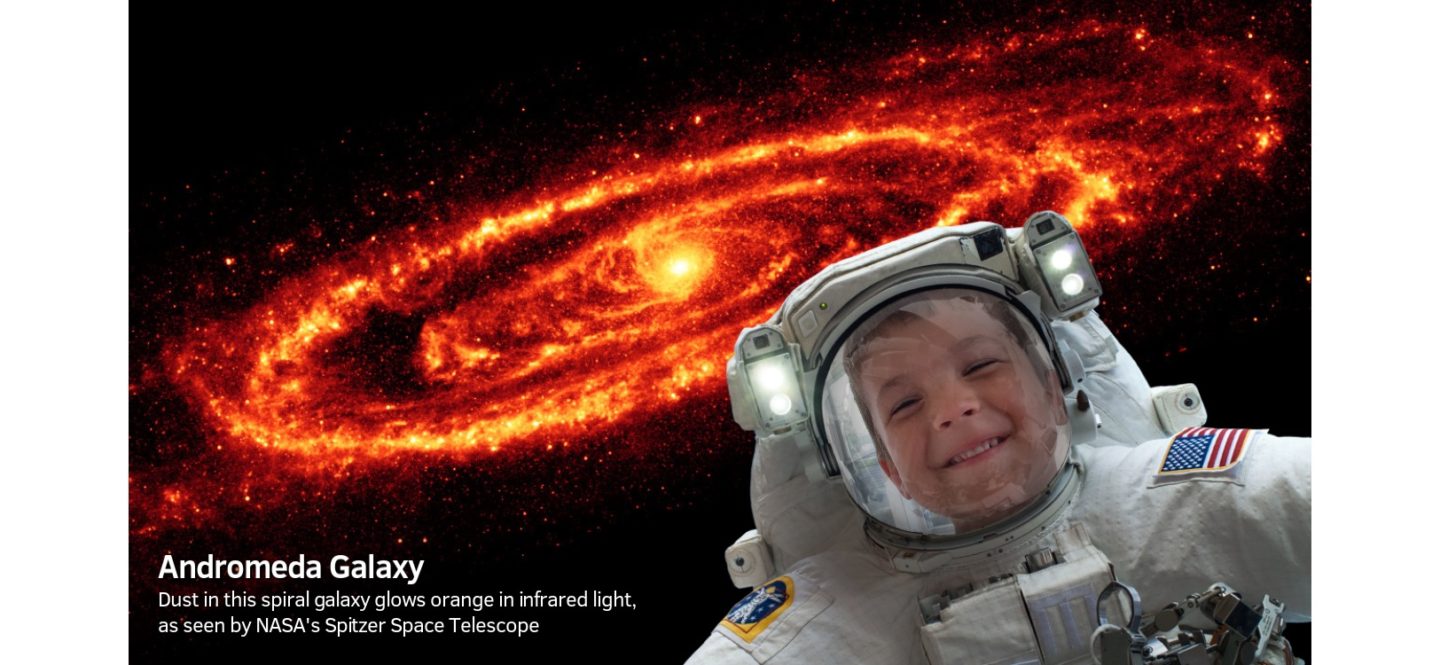
NIGHT SKY APP
Learn to use this planetarium in your pocket that makes it easy to discover the wonders of space wherever you go. Impress the Grands day or night – just aim your Apple device skyward to show them a live 3D map of the heavens, complete with beautifully illustrated constellations, stars, planets, and satellites. A special night mode helps you read the map in the dark, while integrated weather reports show the best times for stargazing. You can even have notifications alert you to future astronomical events.
JACK’S STACK OF STELLAR SPACE BOOKS
Here are five favorites he received for his space-themed 5th birthday party last month. Hop over to the full GrandyCamp post for another six books that are out-of-this-world, and tips on buying a child their first telescope. We made the requisite styrofoam planets to hang from the chandelier and decorated cupcakes with navy icing, edible stardust and space-themed sprinkles.
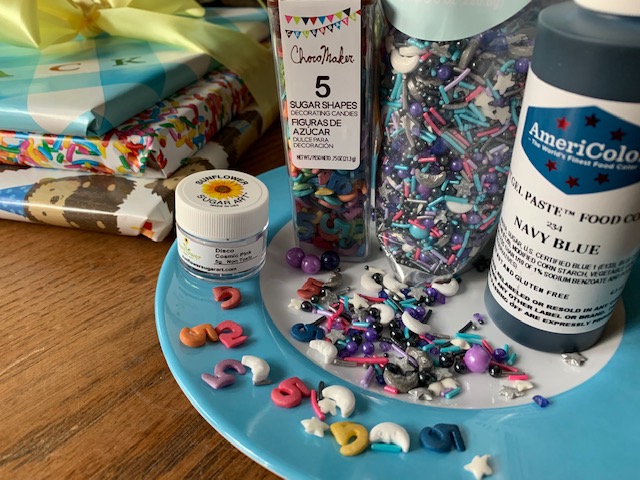

The Ultimate Book of Spaceby Anne-Sophie Baumann, illus. by Olivier Latyck. Yes, pop-up books can get destroyed, but consider it a lesson in teaching the “treasure” in books, and, when there are missing parts after a while, know that it was well-loved. Bursting with 40 flaps, pop-ups, pull tabs, and movable parts, The Ultimate Book of Space provides a richly illustrated, hands-on exploration of space travel, the Earth’s place in our galaxy, the solar system, and so much more! Sure to encourage curious young readers to venture deeper into space, this is a must-have book for any budding scientist’s library. Some “Ultimate” books have been spotted at Costco! Ages 5-8, though Jack got these at 3.
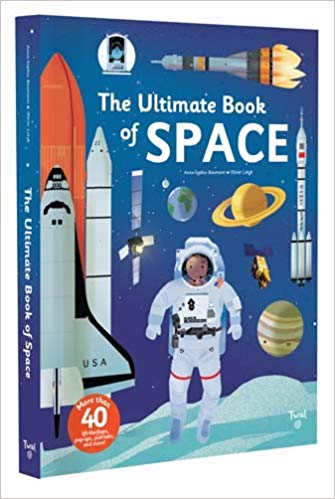
National Geographic Little Kids First Big Book of Space by Catherine Hughes. These colorful pages introduce young children to the wonders of space, with colorful illustrations by David Aguilar and simple text perfect for beginning readers or for reading aloud. The book explains basic concepts of space, beginning with what is most familiar to kids and expanding out into the universe. Ages 4-9.
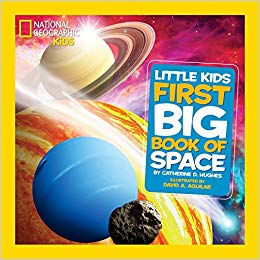
Mousetronaut by Mark Kelly, illus. by C. F. Payne. Astronaut Mark Kelly flew with “mice-tronauts” on his first spaceflight aboard space shuttle Endeavour in 2001. Mousetronaut tells the story of a small mouse that wants nothing more than to travel to outer space. The little mouse works as hard as the bigger mice to show readiness for the mission . . . and is chosen for the flight! While in space, the astronauts are busy with their mission when disaster strikes—and only the smallest member of the crew can save the day. With lively illustrations by award-winning artist C. F. Payne, Mousetronaut is a charming tale of perseverance, courage, and the importance of the small! Ages 5-8. There is also a Mousetronaut Goes to Mars.
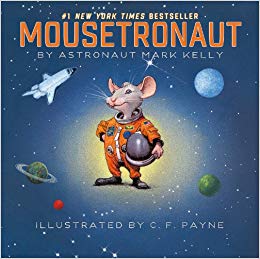
Go For The Moon: A Rocket, A Boy, and the First Moon Landingby Chris Gall. Does this seven-year-old boy, who excitedly witnessed the Apollo 11 flight to the moon, grow up to become an astronaut, an astrophysicist, or and author? Young readers will engage in all the same details of the historic event that inspired this young man. He is not just obsessed with observation and facts, he also launches a water rocket with his younger brother, drinks Tang in his cardboard Columbia, lands a model moon lander by sliding it down a string, and jumps around his yard while practicing his “giant leaps.” Ages 5-8.
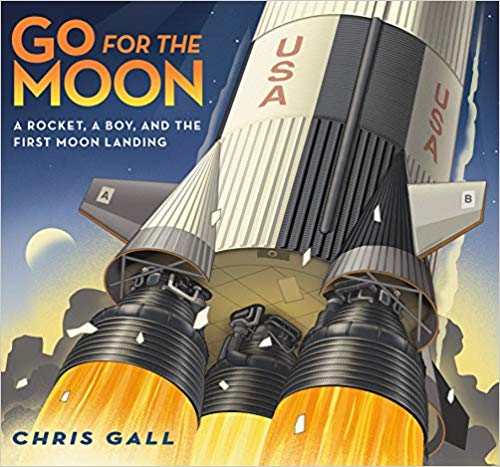
A Hundred Billion Trillion Stars by Seth Fishman, illus. by Isabel Greenberg. This fun, amazing tally of humongous figures—beginning with the estimated population of stars in the universe and going on to an “entire world” that is “filled with crazy numbers” strays from astronomy to other mind-blowing numbers like sharks having 300 teeth, but who is complaining?! Math, science, and interesting stuff for ages 4-9.
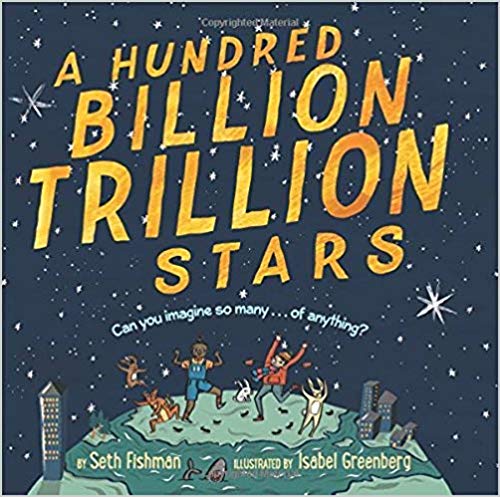
FUN WEBSITES
Did you know that NASA made all its star and galaxy images available on their website copyright free?! NASA’s new image library consolidates imagery spread across 60 collections into one searchable location. Users can embed content in their own sites and choose from multiple resolutions, including the original size, to download.
The kids would have fun with the NASA selfies app which lets you generate snapshots of yourself in a virtual spacesuit, posing in front of gorgeous cosmic locations, like the Orion Nebula or the center of the Milky Way galaxy. The simple interface means you just snap a photo of yourself, pick your background, and share on social media.
The Astronomy Magazine site has a page of Astronomy for Kids full of the latest planet info.
Explore “We are a Go For Launch” with Science Friday and Google Earth about NASA’s storied launchpads and efforts being made to upgrade and preserve them.
My son and I were glued to every radio episode of Science Friday on the way home from school – it made him want to be an astrophysicist – his Grandma made him planet pjs with a matching pillowcase! Science Friday has a lot of entertaining Space Stories for you to share.
EXPLORING THE NIGHT SKY
We are fortunate, in the Twin Cities, to have a new, state-of-the art 120-seat MacMillan Planetarium in the neighborhood! From the comfort of a plush reclining seat, you feel like you’re flying through Earth’s atmosphere to the far reaches of the universe. A 16-meter aluminum dome, constructed using the latest “seamless” technology (first in the world!), surrounds you in a digital theater, offering larger-than-life views in front, above, and behind. The Bell Museum site has a page for Minnesota’s night sky by the month, including meteor showers, a planetary showcase, and a calendar of Night Sky Events. Here is the link for Sept 2019. You may live close enough to be able to use the tips! Come see us! Or do a search with local organizations and universities for similar offerings. Our Science Museum of Minnesota covers all science, but you can also find some amount of planet fun – check their website for Omnimax films and special exhibits.
This link has four tips for sky exploration including planetariums, clubs and bloggers to follow, and where you can find telescope rentals before you buy. Check out the Minnesota Astronomical Society– one of the largest and most active amateur astronomy organizations in the United States!
Comment with resources you find near you – we would love to hear about stellar adventures in every state!
This is a Blog Hop-Link up and leave a comment! We love hearing from you!
Bio- Karen Ritz is a longtime children’s book author and illustrator. She has been chosen for the Society of Illustrators Show, had a book featured on Reading Rainbow, and has materials housed in the Children’s Literature Research Collection at the University of Minnesota. Karen started GrandyCamp to share new creative adventures with her grandchildren, now three and five, after recognizing our new generation of grandparents are busy, active, probably still working, but always interested in creating memories. She lives, paints, and grandparents in St. Paul, Minnesota.






I totally agree with everything you said, Jeanna. Thanks for stopping by and commenting!
Good! So glad you stopped by!
Yes, we do!
That is sooo cool, Lisa! Thank you for sharing that!
I love seeing all these space-related ideas. My father was a NASA engineer his whole career and worked on the various space initiatives through the years so I grew up keeping an eye on the stars. 🙂
So very cool. We need to encourage more kids to think about going into space.
Thank you for these great ideas for grandkids! I’m always on the lookout for some interesting things to do with them
Oh, there’s a new planetarium there, it’s been such a long time since I visited although I’ve been tempted since I was up by LaX and Pepin the last few years for my birthday. I think introducing kids to space or making any kind of science fun is a great idea. I don’t think that sort of thing was encouraged for girls when I was growing up but I became a science fiction fan despite the lack of science in my life.
It sounds like a very cool birthday, someone sure has a wonderful grandma.
That is a sad statistic but I don’t think anyone thinks of space the way we did. Where is the sense of wonderment and the passion for exploration? How nice Jack had a space themed birthday.
You too!
So glad you got your mug!
It’s by Karen Ritz and it is a great post! She’s very talented!
Kids would have fun with the NASA selfies app! Interesting post, Teresa.
Looks like fun, Teresa!
BTW, I received my coffee cup. Thanks for the lead, and for sharing your photos with us at https://image-in-ing.blogspot.com/2019/09/a-visitor.html
Interesting post Teresa 🙂
Have a spacetastic week 🙂